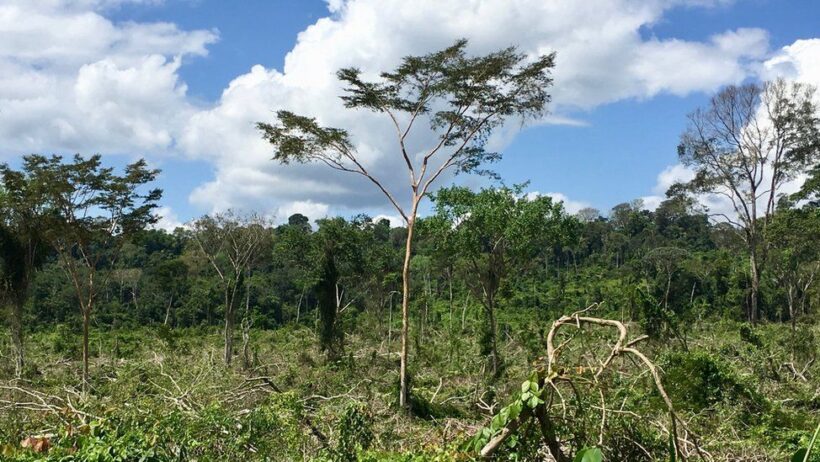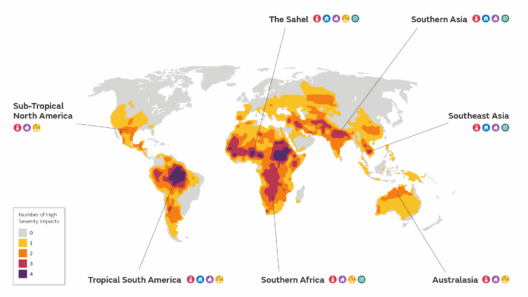Deforestation has emerged as an alarming global issue, intricately linked to climate change and its far-reaching consequences on our planet’s ecosystems. The correlation between tree loss and global warming is not merely a consequence of lost biodiversity; it encapsulates a multifaceted dilemma that underpins the delicate balance of our atmospheric composition. Understanding how deforestation propels global warming necessitates an examination of various interconnected elements, from the carbon cycle to the broader implications of reduced forest cover.
Firstly, trees play an indispensable role in the carbon cycle. Through the process of photosynthesis, they absorb carbon dioxide (CO2) from the atmosphere while releasing oxygen. This process essentially acts as a natural carbon sink, mitigating the greenhouse effect. When forests are cleared for agriculture, urban expansion, or logging, not only is this carbon absorption process disrupted, but the stored carbon within these trees is released back into the atmosphere as CO2, a potent greenhouse gas. The International Panel on Climate Change (IPCC) estimates that deforestation alone contributes to approximately 10-15% of all greenhouse gas emissions. This staggering figure underscores the critical importance of trees in regulating climate.
The aftermath of deforestation is not merely limited to carbon release. The loss of forest cover exacerbates soil degradation and disrupts hydrological cycles. Forests are fundamental to maintaining soil health; they prevent erosion, promote nutrient cycling, and enhance soil structure. Without the protection of trees, soils become vulnerable to erosion, leading to decreased fertility and increased runoff. This loss of arable land can compel agricultural expansion into other forested areas, creating a vicious cycle of destruction and further emissions.
Moreover, forests play a pivotal role in regulating local and global climates. They help to maintain humidity levels, influence precipitation patterns, and moderate temperatures. The clearance of forests disrupts these closely-knit ecological relationships, resulting in changes to regional climates that can lead to droughts, floods, and other extreme weather events. Such climatic shifts not only affect human livelihoods but also threaten countless species that depend on stable climates for survival. The decline in biodiversity resulting from deforestation can reduce the resilience of ecosystems, making them less capable of adapting to climate changes, thus exacerbating the effects of global warming.
Furthermore, the economic dimensions of deforestation cannot be overlooked. While immediate profits can be garnered from logging or land conversion, the long-term environmental costs can be catastrophic. Industries that depend on timber, agriculture, or mining often fail to account for the ecological degradation and carbon emissions associated with their activities. This shortsightedness underscores a broader tendency to prioritize short-term economic gains over sustainable practices. The failure to integrate environmental considerations into economic planning may lead to irreversible consequences for both the planet and future generations.
The intersection of global warming and deforestation reveals social injustices as well. Marginalized communities often depend on forests for their livelihoods, relying on them for food, shelter, and income. When forests are decimated, these communities face displacement and loss of resources, exacerbating poverty and social strife. The intricate web between socio-economic stability and environmental health becomes clear; protecting forests is not only an environmental imperative but also a vital socio-economic concern. Such interdependencies elevate the need for inclusive conservation policies that empower local communities while ensuring ecological integrity.
In addition, illegal logging poses a significant threat to global forest cover. Driven by demand for wood products, illegal logging operations circumvent regulations designed to preserve forests and prevent illegal deforestation. Such activities not only contribute to carbon emissions but also undermine the economic stability of countries that rely on sustainable forest management practices. The global timber trade must address these challenges through stringent regulations and accountability mechanisms to promote sustainable utilization of forest resources while safeguarding against illicit activities.
Addressing deforestation requires an integrative approach that combines conservation with sustainable development practices. Efforts such as reforestation and afforestation can help to restore lost ecosystems and sequester carbon. Reforestation involves planting trees in areas that have previously been deforested, while afforestation refers to establishing forests in previously non-forested areas. Both strategies hold the promise of revitalizing ecological health and combating climate change. However, these initiatives must be carefully planned and executed to ensure that they respect local ecosystems and socio-economic dynamics.
Additionally, global cooperation is essential in combating deforestation and addressing its implications for global warming. Initiatives such as REDD+ (Reducing Emissions from Deforestation and Forest Degradation) focus on incentivizing developing nations to conserve their forests in exchange for financial support, thus fostering a collaborative effort towards sustainable forest management. This cooperative strategy emphasizes that climate action must transcend borders, engaging nations in a shared responsibility for our planet’s health.
In conclusion, the insidious link between deforestation and global warming necessitates urgent action at all levels of society. The consequences of tree loss extend beyond mere environmental degradation; they encapsulate economic, social, and ecological ramifications that jeopardize our future. Protecting and restoring forests is paramount for maintaining the Earth’s climate balance. The fight against deforestation is not simply a battle for trees; it is a critical endeavor to ensure a habitable planet for generations to come. Through awareness, action, and collaboration, it is possible to mitigate the impacts of deforestation and counteract the pressing threat of global warming.







